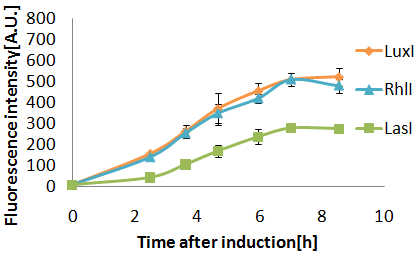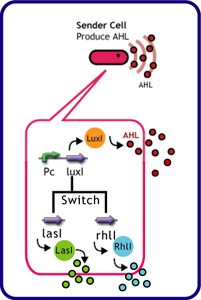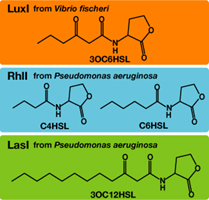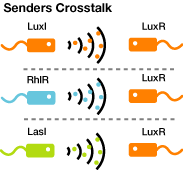Team:Chiba/Sender experiments
From 2008.igem.org
(→Result) |
|||
| (36 intermediate revisions not shown) | |||
| Line 7: | Line 7: | ||
!align="center"|[[Team:Chiba/Project|The Project]] | !align="center"|[[Team:Chiba/Project|The Project]] | ||
!align="center"|[[Team:Chiba/Parts|Parts Submitted to the Registry]] | !align="center"|[[Team:Chiba/Parts|Parts Submitted to the Registry]] | ||
| + | !align="center"|[[Team:Chiba/Reference|Reference]] | ||
!align="center"|[[Team:Chiba/Notebook|Notebook]] | !align="center"|[[Team:Chiba/Notebook|Notebook]] | ||
| + | !align="center"|[[Team:Chiba/Acknowledgements|Acknowledgements]] | ||
|} | |} | ||
| - | == | + | __NOTOC__ |
| - | === | + | |
| + | ==Signal molecule sender== | ||
| + | |||
| + | ==Design== | ||
| + | |||
| + | [[Image:Sender switch Chiba.jpg|left|]] | ||
| + | |||
| + | Each species has their own LuxI-type proteins,which synthesize their specific autoinducers,AHLs.AHLs produced by different LuxI-type proteins differ only in the length of the acyl-chain moiety and substitution at position C-3.LuxR,which is original for Vibrio fischeri,is activated by its cognate autoinducer,3OC6HSL.However,LuxR is also activated by non-endogenous molecules,C4HSL,C6HSL,and 3OC12HSL.Activation by non-endogenous molecules requires a higher signal concentration(2).This results in slower activation of receivers,when AHL concentration is increasing. | ||
| + | |||
| + | <br clear=all> | ||
| + | |||
| + | [[Image:AHL variety chiba.gif|frame|'''Fig.4''' AHL varieties]] | ||
| + | |||
| + | |||
| + | ==Experiment== | ||
| + | To Confirm that communication using non-endogenous molecules results in slower | ||
| + | activation of receivers. | ||
| + | |||
| + | 冨永 | ||
[[Image:Sender crosstalk chiba.gif|frame|right|'''Fig.5''' Senders crosstalk]] | [[Image:Sender crosstalk chiba.gif|frame|right|'''Fig.5''' Senders crosstalk]] | ||
| Line 27: | Line 47: | ||
===Method=== | ===Method=== | ||
| + | 1.Crosstalk test | ||
| + | |||
To characterize quorum sensing crosstalk, constitutive AHL senders were mixed with constitutive receivers and measure fluorescence intensity. | To characterize quorum sensing crosstalk, constitutive AHL senders were mixed with constitutive receivers and measure fluorescence intensity. | ||
| - | #Transformed Senders into E.coli strains( | + | #Transformed Senders into E.coli strains(XL10GOLD) and Receiver into E.coli strain(JW1908). |
#Inoculated them independently in liquid media. Incubated at 37°C 12h | #Inoculated them independently in liquid media. Incubated at 37°C 12h | ||
#Mixed them. | #Mixed them. | ||
| Line 35: | Line 57: | ||
#Measured intensity of green fluorescence at regular time intervals. | #Measured intensity of green fluorescence at regular time intervals. | ||
| - | ===Result=== | + | [[Team:Chiba/protocol/phenotype/timedelay|more details...]] |
| - | ==== | + | |
| + | ===Result and Discussion=== | ||
| + | 目視実験 | ||
| + | *試験管内の培養液(2mL)が、緑色を呈しているときの蛍光強度:150~200。 | ||
| + | --[[User:Masahiro|Masahiro]] 07:16, 29 October 2008 (UTC) | ||
| + | |||
| + | ====[[Team:Chiba/Sender experiments/Senders(JW1908) T9002(JW1908)#Reaction temparature:37°C|Senders(JW1908),T9002(JW1908)@37°C菌数(μL)、Sender:Receiver=500:500,100:1000,10:1000]]==== | ||
| + | *CinI+LVAとLuxRのクロストークはどの菌数比でもおこらない。 | ||
| + | *RhlIが(RhlI+LVA、LasI、CinI+LVAの中で)一番クロストークする。 | ||
| + | *Sender同士のクロストークの時差(蛍光強度200に達するまでの時間)は、1時間以下の範囲でしか発生しなかった。 | ||
| + | |||
| + | ====[[Team:Chiba/Sender experiments/Senders(JW1908) T9002(JW1908)#Reaction temparature:30°C|Senders(JW1908),T9002(JW1908)@30°C菌数(μL)、Sender:Receiver=500:500,100:1000,10:1000]]==== | ||
| + | *特に37°Cで行ったときと差はない | ||
| + | *BWはクオラムセンシングをしやすい株なので、Senderを変えてもたいした時差が見られなかった。 | ||
| + | *次回からはSender側の株をXL10Gに代えて実験を行う。 | ||
| + | |||
| + | ====[[Team:Chiba/Sender experiments/Senders(XL10Gold) T9002(JW1908)#Reaction temparature:37°C|Senders(XL10Gold),T9002(JW1908)@37°C菌数(μL)、Sender:Receiver=500:500,100:1000,10:1000]]==== | ||
| + | *SenderをBW株にして行った実験よりも、8時間後の蛍光強度が平均で200くらい落ちた。 | ||
| + | *この条件ではLasIのクロストークは起こりにくい。 | ||
| + | :(8h後の最終蛍光強度(菌比1:1)、LasI:LuxI(Ptet):RhlI:RhlI+LVA=163:267:394:325) | ||
| + | |||
| + | ====[[Team:Chiba/Sender experiments/Senders(XL10Gold) T9002(JW1908)#Reaction temparature:30°C|Senders(XL10Gold),T9002(JW1908)@30°C菌数(μL)、Sender:Receiver=500:500,100:1000,10:1000]]==== | ||
| + | *37°Cで行った実験と比べ、LasIが活性。(8h後の蛍光強度、37℃:30℃=163:245) | ||
| + | *LasとLux(Plac)1:1で蛍光強度200に達するまでの時間に2.5時間の時差がみられた。 | ||
| + | *Rhlのタグなしとタグ付きの差は、8h後の最終強度にしか現れなかった。 | ||
| + | :また、差が一番でたのが30°Cで行ったこの実験で、タグなし:タグつき=507:456。 | ||
| + | |||
| + | ====[[Team:Chiba/Sender experiments/Senders(XL10Gold) T9002(JW1908)#Reaction temparature:25°C|Senders(XL10Gold),T9002(JW1908)@25°C菌数(μL)、Sender:Receiver=500:500,100:1000,10:1000]]==== | ||
| + | *どのSenderもGFP強度20~50の範囲。ネガコン(T9002のみ)の値、40前後と変わらず。 | ||
| + | (ただし、静置培養のため、しんとう培養した30℃や37℃とは条件が違う。) | ||
| + | |||
| + | --[[User:Yoshimi|Yoshimi]] 06:14, 29 October 2008 (UTC) | ||
| + | |||
| + | --[[User:Masahiro|Masahiro]] 07:47, 29 October 2008 (UTC) | ||
| + | |||
| + | ===Conclusion=== | ||
| + | 3OC6HSL,3OC12HSLに対する、LuxRの応答時間に、二時間の差ができた(3OC12HSLの場合、3OC6HSLに比べて二時間遅れて応答する)。 | ||
| + | そのときの条件は、培養温度30°C、genelatorの株はXL10Gold,Receiverの株はJW1908のとき、であった。 | ||
| + | |||
[[image:senders_crosstalk_chiba_01.gif|frame|left| | [[image:senders_crosstalk_chiba_01.gif|frame|left| | ||
| - | '''Fig.''' senders crosstalk test.senders strain XL10Gold,Receiver strain JW1908.Reaction temparature was 30°C.Labeling:LuxI,RhlI,LasI means fluorescence induced by AHLs synthesized by LuxI,RhlI,LasI respectively.]]<br clear="all"> | + | '''Fig.''' senders crosstalk test.senders strain XL10Gold,Receiver strain JW1908.Reaction temparature was 30°C.All measurements are averages from three replicate cultures with error bars representing standard deviations.Labeling:LuxI,RhlI,LasI means fluorescence induced by AHLs synthesized by LuxI,RhlI,LasI respectively.]]<br clear="all"> |
| + | |||
| + | --[[User:Masahiro|Masahiro]] 09:30, 29 October 2008 (UTC) | ||
| - | |||
| - | |||
{| style="color:white;background-color:Maroon" cellpadding="3" cellspacing="3" border="1" bordercolor="white" width="100%" align="center" | {| style="color:white;background-color:Maroon" cellpadding="3" cellspacing="3" border="1" bordercolor="white" width="100%" align="center" | ||
| Line 48: | Line 108: | ||
!align="center"|[[Team:Chiba/Project|The Project]] | !align="center"|[[Team:Chiba/Project|The Project]] | ||
!align="center"|[[Team:Chiba/Parts|Parts Submitted to the Registry]] | !align="center"|[[Team:Chiba/Parts|Parts Submitted to the Registry]] | ||
| + | !align="center"|[[Team:Chiba/Reference|Reference]] | ||
!align="center"|[[Team:Chiba/Notebook|Notebook]] | !align="center"|[[Team:Chiba/Notebook|Notebook]] | ||
| + | !align="center"|[[Team:Chiba/Acknowledgements|Acknowledgements]] | ||
|} | |} | ||
Latest revision as of 12:14, 29 October 2008
| Home | The Team | The Project | Parts Submitted to the Registry | Reference | Notebook | Acknowledgements |
|---|
Signal molecule sender
Design
Each species has their own LuxI-type proteins,which synthesize their specific autoinducers,AHLs.AHLs produced by different LuxI-type proteins differ only in the length of the acyl-chain moiety and substitution at position C-3.LuxR,which is original for Vibrio fischeri,is activated by its cognate autoinducer,3OC6HSL.However,LuxR is also activated by non-endogenous molecules,C4HSL,C6HSL,and 3OC12HSL.Activation by non-endogenous molecules requires a higher signal concentration(2).This results in slower activation of receivers,when AHL concentration is increasing.
Experiment
To Confirm that communication using non-endogenous molecules results in slower activation of receivers.
冨永
Senders
- [http://partsregistry.org/Part:BBa_K084007 plac+rbs+LasI]
- [http://partsregistry.org/Part:BBa_K084008 plac+rbs+RhlI]
- [http://partsregistry.org/Part:BBa_K084012 plac+rbs+LuxI]
Receiver
- [http://partsregistry.org/Part:BBa_T9002 BBa_T9002 (Express GFP in response to AHL)]
Method
1.Crosstalk test
To characterize quorum sensing crosstalk, constitutive AHL senders were mixed with constitutive receivers and measure fluorescence intensity.
- Transformed Senders into E.coli strains(XL10GOLD) and Receiver into E.coli strain(JW1908).
- Inoculated them independently in liquid media. Incubated at 37°C 12h
- Mixed them.
- Incubated at 30°C.
- Measured intensity of green fluorescence at regular time intervals.
Result and Discussion
目視実験
- 試験管内の培養液(2mL)が、緑色を呈しているときの蛍光強度:150~200。
--Masahiro 07:16, 29 October 2008 (UTC)
Senders(JW1908),T9002(JW1908)@37°C菌数(μL)、Sender:Receiver=500:500,100:1000,10:1000
- CinI+LVAとLuxRのクロストークはどの菌数比でもおこらない。
- RhlIが(RhlI+LVA、LasI、CinI+LVAの中で)一番クロストークする。
- Sender同士のクロストークの時差(蛍光強度200に達するまでの時間)は、1時間以下の範囲でしか発生しなかった。
Senders(JW1908),T9002(JW1908)@30°C菌数(μL)、Sender:Receiver=500:500,100:1000,10:1000
- 特に37°Cで行ったときと差はない
- BWはクオラムセンシングをしやすい株なので、Senderを変えてもたいした時差が見られなかった。
- 次回からはSender側の株をXL10Gに代えて実験を行う。
Senders(XL10Gold),T9002(JW1908)@37°C菌数(μL)、Sender:Receiver=500:500,100:1000,10:1000
- SenderをBW株にして行った実験よりも、8時間後の蛍光強度が平均で200くらい落ちた。
- この条件ではLasIのクロストークは起こりにくい。
- (8h後の最終蛍光強度(菌比1:1)、LasI:LuxI(Ptet):RhlI:RhlI+LVA=163:267:394:325)
Senders(XL10Gold),T9002(JW1908)@30°C菌数(μL)、Sender:Receiver=500:500,100:1000,10:1000
- 37°Cで行った実験と比べ、LasIが活性。(8h後の蛍光強度、37℃:30℃=163:245)
- LasとLux(Plac)1:1で蛍光強度200に達するまでの時間に2.5時間の時差がみられた。
- Rhlのタグなしとタグ付きの差は、8h後の最終強度にしか現れなかった。
- また、差が一番でたのが30°Cで行ったこの実験で、タグなし:タグつき=507:456。
Senders(XL10Gold),T9002(JW1908)@25°C菌数(μL)、Sender:Receiver=500:500,100:1000,10:1000
- どのSenderもGFP強度20~50の範囲。ネガコン(T9002のみ)の値、40前後と変わらず。
(ただし、静置培養のため、しんとう培養した30℃や37℃とは条件が違う。)
--Yoshimi 06:14, 29 October 2008 (UTC)
--Masahiro 07:47, 29 October 2008 (UTC)
Conclusion
3OC6HSL,3OC12HSLに対する、LuxRの応答時間に、二時間の差ができた(3OC12HSLの場合、3OC6HSLに比べて二時間遅れて応答する)。 そのときの条件は、培養温度30°C、genelatorの株はXL10Gold,Receiverの株はJW1908のとき、であった。

--Masahiro 09:30, 29 October 2008 (UTC)
| Home | The Team | The Project | Parts Submitted to the Registry | Reference | Notebook | Acknowledgements |
|---|
 "
"



